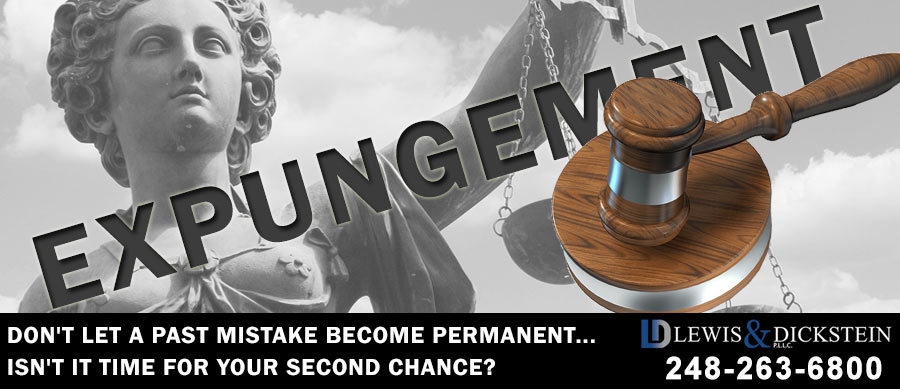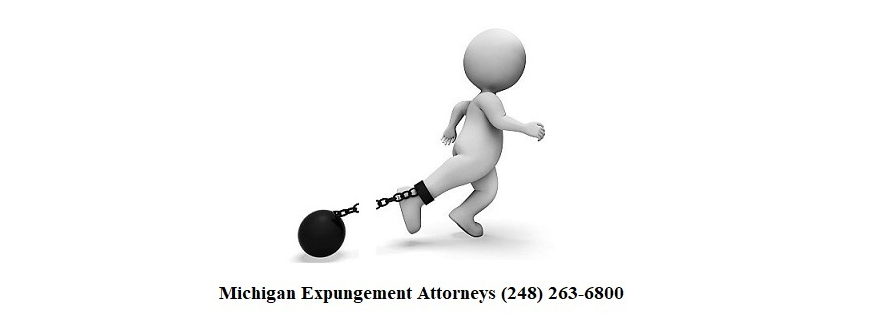Michigan Expungement Law – Specialists That Will Help You!
Michigan has drastically expanded the number and types of offenses that can be expunged or set aside from someone’s criminal history. Here is what you need to know about clearing your record.

Michigan Expungement – The Clean Slate Laws
A few terrible moments in a person’s life should not define them or their character. People change, learn, and grow. If you’ve turned your life around, you deserve a second chance. An experienced criminal defense lawyer can review your record and determine what convictions are subject to expungement to determine if your prior convictions can be set aside. If there are multiple convictions or a combination of felony and misdemeanor convictions, a highly experienced lawyer with new Michigan expungement laws and the expungement process can determine the most successful strategy. You can expunge up to three (3) felony convictions and unlimited misdemeanors.
How to Get an Expungement by Court Order
Expungement by court order is accomplished by filing a Motion to Set Aside Conviction and presenting evidence sufficient to prove to a judge that:
(1) the individual is a law-abiding, worthy candidate, and
(2) removal of the conviction(s) is in the community’s best interest.
In limited circumstances, some convictions are eligible for automatic expungement. For many convictions subject to automatic expungement, you can request an early, court-ordered expungement through a Motion to Set Aside Conviction. According to an April 26, 2023, article in the Detroit News by Beth LeBlanc, automatic expungement does not result in federal firearms rights restoration.
Expungement of Crimes Under the Motor Vehicle Code
Most felony and misdemeanor convictions under the Motor Vehicle Code are expungeable. An expunged traffic offense may remain on someone’s traffic record. Unfortunately, you cannot use Michigan’s new expungement laws to remove a second or subsequent OWI conviction, any traffic offense committed while operating a commercial motor vehicle, or a traffic offense resulting in death or serious injury.
A first-offense OWI can be expunged, but the reviewing judge will consider whether or not the person seeking expungement benefited from rehabilitative or educational programs.
For Expungement Purposes, a Felony is an Offense Punishable by Greater than One Year
Under the old and new expungement laws, a “felony” is an offense punishable by greater than one year, even if the offense is considered a misdemeanor for any other purpose. If the judge denies expungement, the applicant must wait three (3) years until they can re-apply. You should also be aware that a felony or misdemeanor conviction or adjudication that was deferred or taken under advisement and dismissed counts as a misdemeanor under the expungement law.
Some Convictions are Subject to Expungement Right Now
If you were eligible before the new Michigan expungement laws, you could still proceed immediately with the expungement process. There is no need to delay filing an expungement motion, and the new law does not change your eligibility or extend when you can seek relief. The previous expungement law remains valid and in full effect until the Clean Slate Laws take effect.
Before April 12, 2021, a court could set aside or expunge up to one felony conviction and two misdemeanor convictions (not including convictions under the Motor Vehicle Code).

Expungement of Convictions by Motion Under Michigan Law
Michigan expungement laws include several exceptions and limitations, and the Expungement Team with LEWIS & DICKSTEIN, P.L.L.C. can determine your eligibility. The essential new provisions expanding eligibility for expungement include:
- Judges can grant a Motion to Set Aside Conviction(s) and order the expungement of up to three (3) felony offenses and unlimited misdemeanors.
- No more than two (2) assaultive crimes can be expunged (felony or misdemeanor).
- No more than “one” felony could be expunged for identical crimes if the maximum sentence for the offenses was 10 years imprisonment or more.
- The waiting period following discharge from probation, parole, and/or release from custody is as follows:
- three (3) years for most misdemeanors,
- five (5) years for a serious misdemeanor or up to one felony, and
- seven (7) years for multiple felony convictions.
- A new conviction resets the waiting period, and expungement is unavailable with a pending criminal charge.
- Misdemeanor and felony traffic convictions under the Motor Vehicle Code, with some exceptions, can be set aside through expungement (not including a second or subsequent OWI, DUI, or other alcohol/drug-related driving conviction).
- Crimes that cannot be expunged, automatically or by motion, include:
- life felonies or attempted life felonies,
- felony domestic violence with a previous misdemeanor domestic violence conviction,
- second-degree child abuse,
- most criminal sexual conduct offenses (CSC) (including assault with intent to commit CSC),
- a second or subsequent OWI/DUI,
- crimes committed during the operation of a commercial vehicle,
- traffic offenses causing injury or death,
- permitting a 16-year-old or younger female to be in a house of prostitution,
- holding an individual in debt bondage,
- any offense directly or indirectly related to human trafficking for forced labor,
- or any offense related to terrorism.
- A conviction for Criminal Sexual Conduct in the 4th Degree can be expunged if the applicant has no more than two “minor” misdemeanor convictions. Minor misdemeanors are punishable by 90 days or less, subject to a fine of $1,000 or less, and committed by a person who was 21 years old or younger at the time of the offense.
One-Bad Night Rule – Multiple Felonies Equal One Felony
Multiple felonies or misdemeanors that arise within the same 24-hour period and are part of the same incident count as “one” conviction under the “One Bad Night Rule.” The rule does not apply to assaultive crimes, offenses involving using or possessing a dangerous weapon, or crimes with a maximum penalty of 10 or more years in prison.
Automatic Expungement of Prior Convictions
A maximum of two (2) felony convictions and up to four (4) misdemeanors will be subject to automatic expungement, with certain exceptions. Automatic expungement does not apply to an assaultive crime, a crime of dishonesty, a felony punishable by 10 or more years, a crime against a child or vulnerable adult, or a crime related to human trafficking. Under new Michigan expungement laws, the waiting periods before automatic expungement are as follows:
- 10 years following sentencing or release from custody, whichever is later, for felony convictions.
- Seven (7) years following the imposition of sentence for a misdemeanor punishable by 93 days to 1 year.
- Any misdemeanor, regardless of how many, that is punishable by 92 days or less, will be automatically expungement seven (7) years from the imposition of the sentence.
Under Michigan expungement law, the waiting period starts over for any offense if there is a subsequent criminal conviction. Expungement is unavailable with a pending charge.

Assaultive Crimes Under Clean Slate Expungement Laws
The following are assaultive crimes under the new Michigan expungement law and cannot be automatically expunged:
- Threats, assaults, and batteries against Family Independence Agency employees,
- Any felony or misdemeanor assault of any type,
- Carjacking and Robbery,
- Offenses involving explosives, harmful chemicals, biological substances, radioactive material, electronic or electromagnetic devices, offensive or injurious substances or compounds, combustible substances,
- Offenses related to terrorism,
- Murder, Homicide, Assault with Intent to Murder, and Mayhem,
- Kidnapping, Unlawful Imprisonment, or taking an adult or child hostage,
- Stalking,
- Criminal Sexual Conduct (CSC), Molestation, Child Abuse, Rape,
- A crime resulting in miscarriage, stillbirth, death, or harm to an embryo or fetus,
- Home Invasion, and
- Felonious Discharge of a Firearm.
Serious Misdemeanors Under the Clean Slate Expungement Laws
- Assault and Battery, Aggravated Assault, and Domestic Violence,
- Breaking and Entering or Illegal Entry,
- Child Abuse 4th Degree,
- Contributing to the Delinquency of a Minor or Neglect of a Minor,
- Using the Internet for Prohibited Communication,
- Aiming a Firearm Without Malice,
- Discharge of a Firearm Aimed at a Person (causing injury or not),
- Indecent Exposure,
- Stalking,
- Injuring a Worker in a Work Zone,
- Leaving the Scene of a Personal Injury Accident,
- Selling or Furnishing Alcohol to a Minor
“Crime of Dishonesty” Under the Clean Slate Michigan Expungement Laws
The following offenses are considered “crimes of dishonesty” under the new expungement laws and are not subject to automatic expungement.
- RICO and Racketeering,
- A felony involving an altered, forged, or counterfeit currency, public record, transaction device, document affecting an interest in real property, identifying mark, union label, or a note, certificate, bond, warrant, or other instrument issued by a government entity, bank, or financial institution,
- Possessing, selling, or using tools or implements for counterfeiting bills or notes,
- Embezzlement,
- Obtaining or attempting to obtain by fraud, deceit, misrepresentation, coercion, or unjust enrichment from a vulnerable adult,
- Fraudulent Access to Computers, Computer Systems, and Networks, or
- Use of a Computer to Commit a Crime.
Expungement of Possession of Marihuana Convictions
Michigan expungement law now provides a path for the expedited removal of marijuana convictions. A person convicted of one or more misdemeanor marihuana offenses, including possession of marihuana paraphernalia, may apply to set aside the conviction. There is no waiting period for you to apply for expungement of a marijuana conviction. The judge will presume that the possession conviction was related to conduct that is no longer illegal. The prosecutor can object to the request for expungement within 60 days if they believe the conduct would still violate current Michigan law. If the prosecutor does not object within 60 days, the judge must set aside the conviction within 21 days. If the prosecutor does file an objection within 60 days, the court will conduct a hearing, and the prosecution will have to prove the conduct would constitute a current crime.

How to Win an Expungement and Clear Your Record
A lawyer is not required under Michigan expungement law; however, only an experienced expungement attorney will know the best strategies and arguments to persuade a judge to set aside one or more previous convictions. Our attorneys have decades of experience and a winning strategy. Most people who file for expungement without counsel or with a substandard or inexperienced lawyer are unsuccessful. Because someone who unsuccessfully attempts to expunge their record must wait a minimum of three (3) years to try again, it is better to do it right the first time. Don’t be sold out by the lowest bidder and then get stuck waiting years to try again from a disadvantaged position.
The Expungement Team with LEWIS & DICKSTEIN, P.L.L.C. has decades of experience and an unparalleled track record of success winning expungements in district and circuit courts throughout Michigan. If you call us for a free consultation, we will take the time to talk with you, answer your questions, and address your concerns. If there is a way to help you, we will find it.
Call us today at (248) 263-6800 for a free consultation or complete an online Request for Assistance Form. We will contact you promptly and find a way to help you.







